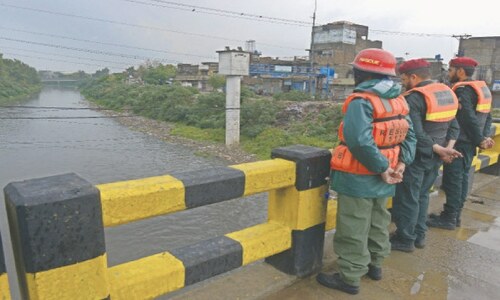ISLAMABAD, April 5: The agreement of political parties on a code of conduct for the upcoming elections has been noted as a major achievement. However, at the seminar held on Friday, speakers discussed the many challenges that remain.
The event was organised by the Jinnah Institute with the support of the Asia Foundation.
The two organisations initiated a nation-wide consultative process that sought feedback from mainstream political parties on how they planned to enforce the electoral code of conduct.
Over 15 parties responded; the recommendations and observations have been passed on to institutions including the Election Commission, local authorities, the caretaker government and the parties themselves.
Gareth Aicken, the Asia Foundation's country representative, noted the major milestone of a National Assembly completing its full term.
“A successful transition now,” he said, “may build up trust in the democratic system for generations to come.” If successful, “the upcoming elections will lay the foundation of a more democratic and stable government.”
Siddique-ul-Farooq, of the Pakistan Muslim League-Nawaz, said the agreement showed stability and maturity.
That the differing parties could agree on a single code “is a very positive sign, and a clear indication that the Pakistani nation is moving forward, despite its problems.”
Many speakers, while acknowledging the significance of the code, pointed out that its implementation could be a challenge. Official authorities, they said, had little monitoring capability; implementation would be up to the parties.
The Muttahida Qaumi Movement's Khawaja Izharul Hassan, claiming that the MQM was the ‘most disciplined’ party of the country, stressed the importance of ensuring an even playing field. The country's institutions, he said, should not allow the marginalisation of any party.
The PTI's Col. Younus added that the process of scrutiny for candidates' applications should be improved, in part by placing more emphasis on the candidates' finances and incomes.
The JUI-F's representative, Jan Achakzai, also promised that his party would adhere to the code, though he surprised many with his clean-shaven, tie-clad appearance, and with the emphasis he placed on facilitating access for women voters.
The director of the Jinnah Institute, Raza Rumi, said, “It is a significant achievement that the political parties themselves have agreed on a code of conduct.” But a code itself is not a panacea, he said, adding that the security climate prevailing in the country could still threaten free and fair elections.














































Dear visitor, the comments section is undergoing an overhaul and will return soon.